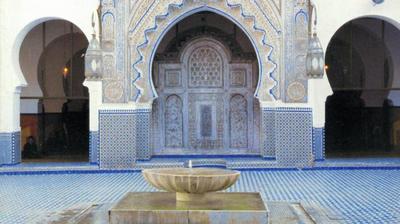Sound of the Soul [documentary film]
 Tonight, enjoyed Stephen Olsson's marvelous SOUND OF THE SOUL: The Fez Festival of World Sacred Music (2005) -- a most satisfying music documentary. The week-long, annual summer festival it covers (international in scope) is one I should hope to enjoy, some future year. The gamut of musical offerings amounts to a glut of goodness. The (quick-sketched) history of Fez, too, was fascinating.
Tonight, enjoyed Stephen Olsson's marvelous SOUND OF THE SOUL: The Fez Festival of World Sacred Music (2005) -- a most satisfying music documentary. The week-long, annual summer festival it covers (international in scope) is one I should hope to enjoy, some future year. The gamut of musical offerings amounts to a glut of goodness. The (quick-sketched) history of Fez, too, was fascinating.The filmmaker's blurb describes the work (in part) thus:
SOUND OF THE SOUL begins with the historic city of Fez itself: its heritage of tolerance as an ancient sanctuary for Muslim, Jewish and Christian inhabitants; its mystical Islamic foundations; its evocative medieval sites. This is the ideal location for an exceptional festival that brings together a unique array of musicians -- a transcendent chorus of African Berber women, a Portuguese Fado singer, a French early music ensemble, and players and vocalists from Afghanistan, England, Russia, Ireland, Mauritania, Turkey and even a gospel band from Harlem. All are intermixed with unforgettable Moroccan Sufi performers and all are connected through their artistry by profound expressions of love and longing.A friend who spent some seasons in Morocco on a Fullbright recently -- and attended the Festival seen in this film -- remarked that this Harlem band was particularly enjoyed by the Fez denizens. I'm thinking this may partly be for sheer novelty; but open musical curiousity and wide trans-cultural appreciations were evidently ubiquitous among international visitors & locals alike.
Besides the filmmaker's worthy contextualizing, music-wise I was pleased by the rare (to my ears) chance to enjoy the opening couplets of Rumi's Mathnawi -- the classic song of the reed, sung superbly by notable Afghani vocalist Ustad Farida Mahwash. Along with this film's world premiere at the Mill Valley Film Festival two weeks ago, a post-screening concert featuring this singer, smartly, was on offer.
Likewise absorbing were sounds from the renowned Tallis Scholars -- leading exponents of Renaissance British & European a'cappella sacred song.
Possibly most arresting for me (must one choose among these riches?) was the exquisite Fado singing by Katia Guerreiro, whose brief explication of the Portuguese conception of saudade (spiritual loneliness & longing) was movingly exemplified in her performance. A prayer-song addressed to the Virgin Mary proved bewitching.
If I were a scholar in comparative esthetics, I can imagine launching a study pondering points of similarity among the Portuguese saudade, the Spanish duende (memorably expounded upon by Garcia-Lorca in his lecture), the conception of dard central to the poetry of the Urdu ghazal, and perhaps also the idea of karuna in the Sanskritic esthetic theory of the rasas [universal emotions] (diversely illustrated through centuries of sacred & secular literature & music throughout India). [Tagore's "pang of separation" is but one of myriad expressions of this.] But my days for such academic scholarship (if ever such a window existed) appear long gone. Indeed, I should pull myself from blogdom & get busy transferring video awaiting editing. The days & nights pass all too quickly.
Even so, who needs that academic study of concepts? Best to absorb their vivid essence through music like this. When we hear, we know (& feel) what we most need to know (through hearing/feeling).
My notes above of a few highlights in this film give a mere, imcomplete smattering. See the thing yourself, savor it directly. In fine, Uncle David suggests: keep eyes peeled for this film! Ears & heart seem to require food like this.


1 Comments:
"author's note":
In bygone years, I used to dabble in arts-journalism. It's been some 15 years since those days! (my latest & most satisfying gig having been a couple years as a writer & editor for the now-long-erstwhile EAR Magazine in NYC. I left New York in 1991, and regrettably the magazine folded a year or so later.)
It seems I'm starting to revive the old habit in this blog. This small post is my first substantive arts-critique per se (though a few other jottings inched toward the direction). Perhaps I'll do this now & then: an occasional pastime.
Post a Comment
<< Home